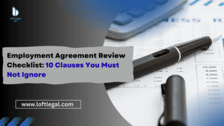


Review these 10 employment contract clauses before signing: non-competes, termination, compensation. Avoid costly mistakes & negotiate better terms.
Signing an employment agreement is a big moment in your career. Whether you’re stepping into a new role or securing a promotion, the fine print in that contract can affect your salary, job responsibilities, legal rights, and future opportunities. Unfortunately, many professionals rush through the process, assuming employment contracts are standard and non-negotiable. That’s a mistake.
Every employment contract should be carefully reviewed to make sure it reflects fair terms and doesn’t trap you in restrictive or unclear obligations. To help you navigate this important step, here’s a practical employment agreement review checklist that outlines 10 clauses you must understand before signing.
Start with the basics. Your role, title, and responsibilities should be clearly stated. Vague descriptions or catch-all phrases like “other duties as assigned” can leave room for exploitation.
What to check:
Are your core responsibilities clearly listed?
Does the contract allow the employer to change your duties at will?
Who will you report to?
A lack of clarity here could lead to taking on work beyond your role without added compensation.
Never rely on verbal promises—everything from base salary to bonuses and health coverage should be clearly documented.
Look for:
Is your salary fixed or performance-based?
Are bonus structures and eligibility criteria explained?
Are benefits like insurance, paid time off, and stock options included?
If it’s not in writing, it doesn’t exist. Make sure all agreed compensation is reflected in the agreement.
Understand the nature of your employment—whether it’s at-will, contract-based, or permanent—and how it can be ended.
Review carefully:
Is there a notice period for termination?
Are severance payments outlined?
What defines “termination for cause”?
A strong employment contract review should ensure you’re not left jobless without notice or compensation.
These clauses can limit your ability to work for competitors or contact former clients or colleagues after leaving the job.
Important to evaluate:
Duration and geographic scope of restrictions
Whether the language is overly broad or industry-wide
Applicability in your state (some states restrict or ban non-competes)
Unreasonable non-compete clauses can derail your career. If the terms are too strict, negotiate or seek help from an employment contract review attorney.
Most companies require you to keep trade secrets confidential. But some go further—claiming ownership over any ideas or work you create, even in your free time.
Ask yourself:
Does the employer claim rights to side projects?
Can you exclude prior inventions?
How long are you bound by confidentiality?
Protect your personal innovations and side work with clear boundaries.
If the contract includes a probation period (usually 3–6 months), understand what that entails.
Key points:
What are the evaluation criteria?
Will your role become permanent automatically?
Do pay or benefits change after probation?
Don’t let an undefined probation clause lead to job insecurity.
Workplace flexibility is more common now, but that doesn’t mean your contract reflects it.
Review:
Core working hours and expectations
Remote work arrangements—temporary or permanent?
Any potential for mandatory relocation?
An unclear work-location clause can impact your lifestyle more than you expect.
Many agreements now include arbitration clauses that waive your right to take legal action in court.
Review:
Will you be required to resolve disputes through arbitration?
Which jurisdiction governs the contract?
Understanding these clauses helps you know your legal options if issues arise.
Some contracts include garden leave—a period during your notice where you’re still employed and paid, but barred from working elsewhere.
Ask:
How long can the company enforce garden leave?
Will you be paid in full?
Without fair pay, it can function as a non-compete by another name.
This section confirms that only written changes are valid and defines the full scope of the agreement.
Why it matters:
Without this, an employer might try to alter terms unilaterally. Make sure any changes to salary, duties, or benefits require your written consent.
An employment contract review isn’t just paperwork—it’s a safeguard for your future. Don’t hesitate to ask questions, push for clarification, or negotiate terms that don’t align with your expectations. If you’re uncertain about any clause, consider consulting a professional employment contract review attorney. Remember, once you sign, you’re legally bound. Take the time to ensure every term reflects your best interests.
